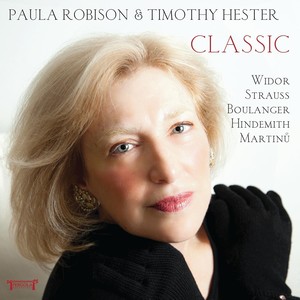
Classic
- 流派:Classical 古典
- 语种:其他
- 发行时间:2017-09-28
- 类型:录音室专辑
- 歌曲
- 时长
-
Suite pour flute et piano, Op. 34
-
Sonate für Flöte und Klavier
-
8 Gedichte aus "Letzte Blätter", Op. 10
-
Sonata for Flute and Piano
简介
When Tim and I found that we had the opportunity to make this recording we thought a lot about what we wanted to include. The list was very long! The flute and piano repertoire is very rich! Finally we came up with a group of our classic favorites. They paint a lively picture of our work together through the years. Widor’s Suite is a tour de force for both flute and piano. It begins with a sudden magical gesture and then tells us a story filled with twists and turns, sprites and spells, romance, tenderness and danger, and does not let us go until the final jubilant bars of redemption. Richard Strauss’s Improvisation from his Sonata for violin and piano is perfectly suited to the flute, mirroring the rose scenes in his opera “Der Rosenkavalier” with their wistfulness, passion, and regret, and including a final wisp of a quote from Beethoven which seems to be the Marschallin saying “Ah, well….” Tim wanted to include Strauss’s great song “Die Nacht”. This song stands in half-light as the sun sets. All is bathed in gold, and as the coming night robs the world of its color the singer wonders if it will take her lover away too. Lili Boulanger’s Nocturne would reassure her. Here the moon shines on a mysterious and passionate landscape. This wonderful composer died much too soon. We can only imagine what other exquisite works she would have left for us had she lived to maturity. We wanted to include Hindemith’s Sonate because it is a masterpiece, written in 1936, in Germany, just as the composer realized that he had to leave his homeland. It is Hindemith at his finest, calling up all the beauties of his heritage, paying homage to them, mourning his loss, and then resolutely beginning his march towards a new life. Martinu’s Sonata completes our collection. This great Czech composer was born surrounded by the song of bells, in the tower of the church where his father was the town’s bellkeeper. We hear those bells everywhere in the sonata, which celebrates Martinu’s arrival in America after a brutal wartime experience and escape from Europe. The composer was visiting friends on Cape Cod in Massachusetts and they rescued an injured whippoorwill and nursed it back to health. The bird sings throughout, even when the bells toll sadness, and finally emerges along with them at the end in joyous harmony with all the world. - Paula Robison

